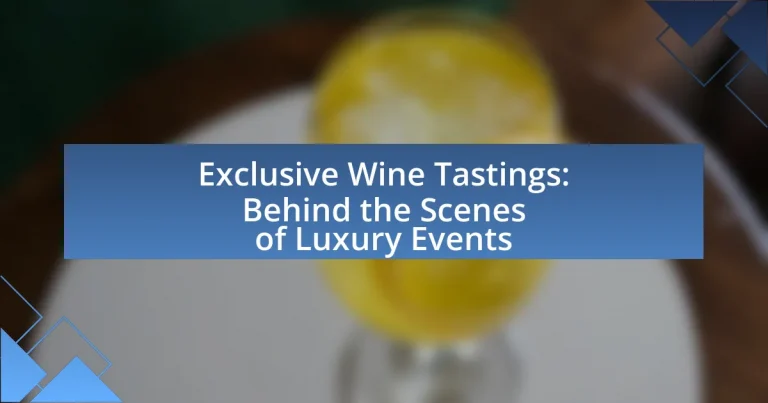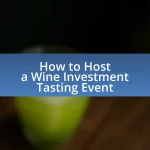Exclusive wine tastings are curated events where participants sample high-quality, often rare wines in intimate settings, guided by experts such as sommeliers or winemakers. These tastings differ from regular events by featuring limited-edition bottles and personalized service, enhancing the overall experience. The article explores the unique aspects of exclusive wine tastings, including the selection of wines, the role of sommeliers, logistical considerations, and emerging trends such as sustainability and technology. It also highlights the demographics of attendees and provides tips for enhancing the tasting experience, ensuring a comprehensive understanding of these luxury events.
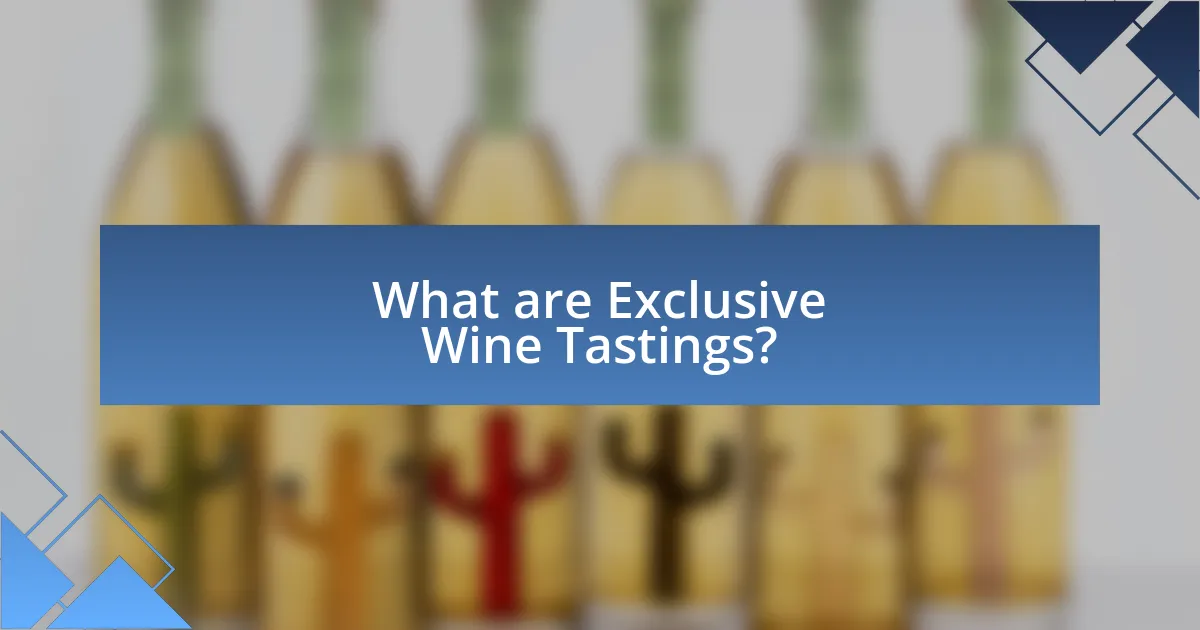
What are Exclusive Wine Tastings?
Exclusive wine tastings are curated events where participants sample a selection of high-quality wines, often featuring rare or limited-edition bottles. These tastings typically occur in intimate settings, allowing for in-depth exploration of the wines’ characteristics, origins, and production methods. Exclusive wine tastings often include expert guidance from sommeliers or winemakers, enhancing the educational experience. The exclusivity is often marked by the availability of wines that are not widely accessible to the public, making these events particularly sought after by wine enthusiasts and collectors.
How do Exclusive Wine Tastings differ from regular tastings?
Exclusive wine tastings differ from regular tastings primarily in their level of exclusivity and the quality of the wines presented. Exclusive tastings often feature rare, high-end wines that are not available to the general public, providing a unique experience for participants. For instance, exclusive events may showcase limited-edition vintages or wines from prestigious vineyards, which are typically not included in standard tastings. Additionally, exclusive tastings often include personalized service, expert sommeliers, and curated pairings, enhancing the overall experience compared to regular tastings that may offer a broader selection of more accessible wines without the same level of detail or expertise.
What unique experiences do Exclusive Wine Tastings offer?
Exclusive Wine Tastings offer personalized interactions with winemakers and sommeliers, allowing participants to gain in-depth knowledge about the wines being sampled. These tastings often feature rare or limited-edition wines that are not available to the general public, enhancing the exclusivity of the experience. Additionally, attendees typically enjoy curated food pairings that complement the wines, creating a holistic sensory experience. Exclusive settings, such as private vineyards or luxurious venues, further elevate the ambiance, making the event memorable.
Why are Exclusive Wine Tastings considered luxury events?
Exclusive wine tastings are considered luxury events due to their curated experiences, high-quality selections, and exclusivity. These events often feature rare and premium wines that are not readily available to the general public, enhancing their appeal. Additionally, they typically take place in upscale venues, often accompanied by gourmet food pairings and expert sommeliers, which further elevates the experience. The combination of limited access to exceptional wines and the sophisticated atmosphere creates a sense of exclusivity and prestige, solidifying their status as luxury events.
What types of wines are featured in Exclusive Wine Tastings?
Exclusive Wine Tastings feature a curated selection of premium wines, including rare vintages, limited-edition releases, and renowned varietals from prestigious vineyards. These tastings often highlight wines such as Cabernet Sauvignon, Pinot Noir, Chardonnay, and Bordeaux blends, showcasing their unique characteristics and terroirs. The exclusivity of these events is underscored by the inclusion of wines that are not widely available, often sourced from small, artisanal producers or celebrated wine regions, ensuring a unique experience for participants.
How are the wines selected for these events?
Wines for exclusive events are selected based on a combination of quality, provenance, and thematic relevance. Expert sommeliers and wine curators evaluate various factors, including the wine’s vintage, region, and tasting notes, to ensure they align with the event’s goals and audience preferences. For instance, a luxury event may feature rare vintages from renowned vineyards, enhancing the exclusivity and appeal of the tasting experience. This selection process often involves tasting sessions and consultations with winemakers to guarantee that only the finest wines are presented, ensuring a memorable experience for attendees.
What regions or varietals are most commonly showcased?
The regions most commonly showcased in exclusive wine tastings are Bordeaux, Napa Valley, and Burgundy, while varietals frequently highlighted include Cabernet Sauvignon, Chardonnay, and Pinot Noir. Bordeaux is renowned for its prestigious red blends, Napa Valley is celebrated for its high-quality Cabernet Sauvignon, and Burgundy is famous for its exceptional Pinot Noir and Chardonnay. These regions and varietals are often featured due to their historical significance, reputation for quality, and the demand from connoisseurs and collectors.
Who typically attends Exclusive Wine Tastings?
Exclusive wine tastings are typically attended by affluent individuals, wine enthusiasts, sommeliers, and industry professionals. These attendees often seek to experience rare and high-quality wines, engage in networking opportunities, and expand their knowledge of wine. The exclusivity of such events attracts those with a keen interest in fine wines, often including collectors and connoisseurs who appreciate the nuances of different vintages and varietals.
What demographics are most interested in these luxury events?
Affluent individuals aged 30 to 60 are the demographics most interested in luxury events, particularly exclusive wine tastings. This age group typically possesses higher disposable incomes and a greater appreciation for fine wines and gourmet experiences. According to a report by the Luxury Institute, 70% of luxury consumers are between 30 and 60 years old, indicating a strong correlation between age, wealth, and interest in luxury events. Additionally, this demographic often includes professionals and executives who value networking opportunities that such events provide, further driving their participation in exclusive wine tastings.
How do attendees benefit from participating in Exclusive Wine Tastings?
Attendees benefit from participating in Exclusive Wine Tastings by gaining access to unique wine selections and expert knowledge from sommeliers. These events often feature rare or limited-edition wines that are not available to the general public, enhancing the tasting experience. Additionally, attendees receive personalized guidance on wine pairings and tasting techniques, which can deepen their appreciation and understanding of wine. Research indicates that immersive experiences, such as exclusive tastings, significantly enhance consumer satisfaction and loyalty in the luxury market, as they create memorable interactions with the product and brand.
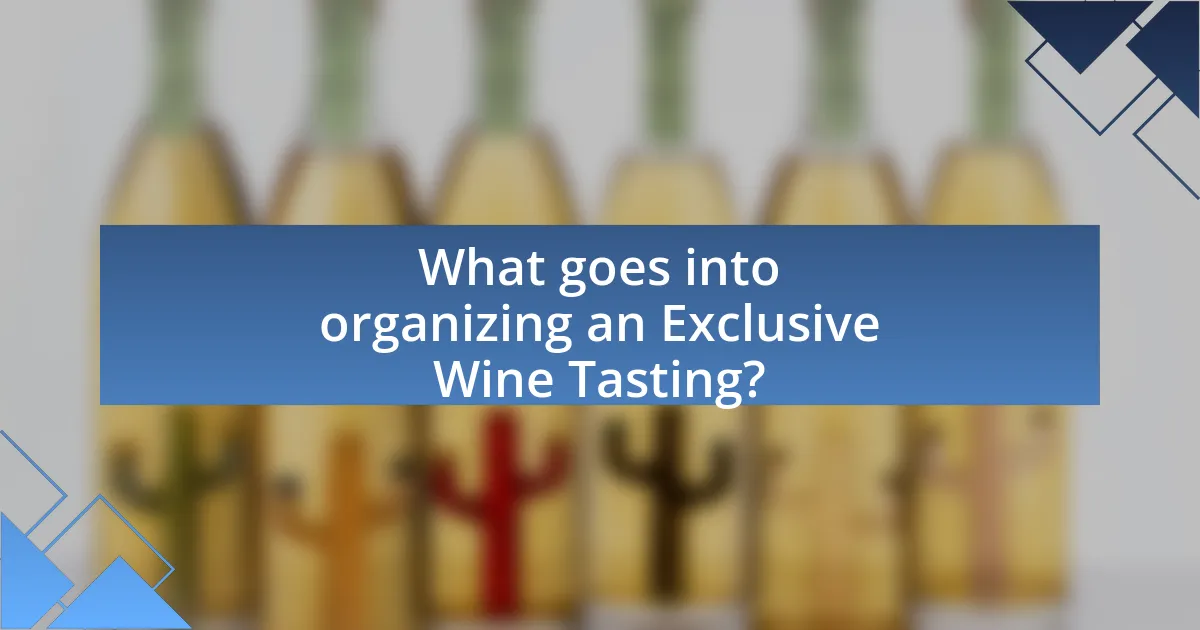
What goes into organizing an Exclusive Wine Tasting?
Organizing an exclusive wine tasting involves several key components, including selecting a suitable venue, curating a diverse wine selection, and planning the event logistics. The venue should reflect the exclusivity of the event, often featuring elegant settings that enhance the tasting experience. Curating a diverse selection of wines, typically from renowned vineyards or unique regions, allows guests to explore various flavors and styles, which is essential for an engaging tasting experience. Additionally, meticulous planning of logistics, such as invitations, catering, and staff training, ensures that the event runs smoothly and meets the high expectations associated with luxury events.
How are venues chosen for Exclusive Wine Tastings?
Venues for Exclusive Wine Tastings are chosen based on factors such as ambiance, accessibility, and the venue’s ability to enhance the wine experience. High-end locations often feature elegant settings that complement the luxury of the event, while accessibility ensures that guests can easily attend. Additionally, venues with a reputation for hosting prestigious events or those that offer unique features, such as scenic views or historical significance, are preferred. For instance, renowned wineries or upscale hotels are frequently selected due to their established connections to the wine industry and their capacity to provide a memorable atmosphere.
What factors influence the selection of a venue?
The selection of a venue for exclusive wine tastings is influenced by several key factors, including location, capacity, ambiance, accessibility, and amenities. Location is crucial as it should be convenient for guests and ideally situated in a wine-producing region to enhance the experience. Capacity must accommodate the expected number of attendees while allowing for an intimate atmosphere. Ambiance plays a significant role, as the venue should reflect the luxury and exclusivity of the event, often requiring elegant decor and a sophisticated setting. Accessibility ensures that guests can easily reach the venue, which is particularly important for high-profile events. Lastly, amenities such as catering options, audio-visual equipment, and parking facilities can significantly impact the overall experience, making them essential considerations in venue selection.
How does the venue enhance the overall experience?
The venue enhances the overall experience by providing an immersive and luxurious atmosphere that complements exclusive wine tastings. A well-designed venue can elevate the sensory experience through its aesthetic appeal, acoustics, and ambiance, which are crucial for creating a memorable event. For instance, venues with elegant decor and appropriate lighting can highlight the wines being showcased, making them more visually appealing and enhancing the tasting experience. Additionally, venues that offer unique architectural features or scenic views can create a captivating backdrop, further enriching the guests’ enjoyment. Research indicates that the environment significantly influences consumer perceptions and satisfaction, underscoring the importance of venue selection in luxury events.
What role do sommeliers play in Exclusive Wine Tastings?
Sommeliers play a crucial role in exclusive wine tastings by curating and presenting a selection of wines that enhance the overall experience for attendees. They utilize their extensive knowledge of wine regions, varietals, and food pairings to create a thoughtfully designed tasting menu that highlights the unique characteristics of each wine. Additionally, sommeliers facilitate the tasting process by providing detailed descriptions, tasting notes, and insights into the winemaking process, which enriches the guests’ understanding and appreciation of the wines being served. Their expertise ensures that the wines complement the culinary offerings and align with the theme of the event, ultimately elevating the luxury experience for participants.
How do sommeliers curate the wine selection?
Sommeliers curate the wine selection by evaluating various factors such as the event’s theme, guest preferences, and food pairings. They utilize their extensive knowledge of wine regions, varietals, and vintages to create a balanced and diverse selection that enhances the overall dining experience. Sommeliers often conduct tastings to assess the quality and compatibility of wines, ensuring that each choice aligns with the culinary offerings and the event’s atmosphere. Their expertise is supported by formal training and certifications, such as those from the Court of Master Sommeliers, which emphasize the importance of sensory evaluation and wine service.
What expertise do sommeliers bring to the event?
Sommeliers bring specialized knowledge of wine selection, pairing, and service to the event. Their expertise includes understanding wine regions, grape varieties, and the intricacies of flavor profiles, which allows them to curate a wine list that complements the event’s cuisine and enhances the overall guest experience. Additionally, sommeliers are trained in proper wine service techniques, ensuring that wines are served at the correct temperature and in appropriate glassware, which is crucial for maximizing the sensory experience. Their ability to educate guests about wine choices and provide personalized recommendations further elevates the event’s sophistication and enjoyment.
What are the logistical considerations for hosting these events?
Logistical considerations for hosting exclusive wine tastings include venue selection, catering, transportation, and staffing. The venue must accommodate the expected number of guests while providing an appropriate atmosphere for luxury events, often requiring a space with aesthetic appeal and necessary amenities. Catering involves sourcing high-quality food pairings that complement the wines, which necessitates coordination with reputable caterers experienced in fine dining. Transportation logistics are crucial for ensuring the safe delivery of wines and equipment, as well as providing guest transportation if needed, particularly for events featuring premium wines that require careful handling. Staffing considerations include hiring knowledgeable personnel, such as sommeliers and event coordinators, who can enhance the guest experience through expertise and service. These factors collectively ensure a seamless and memorable event, aligning with the expectations of luxury wine tasting experiences.
How is the guest list managed for Exclusive Wine Tastings?
The guest list for Exclusive Wine Tastings is managed through a combination of invitation-only access and RSVP tracking. Organizers typically curate a list of potential attendees based on their interest in wine, previous participation in similar events, and their status within the wine community. Invitations are sent out well in advance, often accompanied by a detailed description of the event and the wines to be featured.
To ensure an accurate headcount and manage seating arrangements, organizers require guests to RSVP by a specified deadline. This process allows for adjustments to be made based on the number of confirmations received, ensuring that the event remains exclusive and intimate. Additionally, some events may utilize ticketing systems to further streamline guest management and maintain a controlled environment.
What are the key elements of event planning for these tastings?
The key elements of event planning for exclusive wine tastings include venue selection, guest list management, wine selection, catering, and logistics coordination. Venue selection is crucial as it sets the ambiance and accommodates the expected number of guests. Guest list management ensures that invitations are sent to the right audience, often including wine enthusiasts and industry professionals. Wine selection involves curating a diverse range of wines that align with the theme of the tasting, often sourced from reputable vineyards. Catering complements the wine offerings, providing food pairings that enhance the tasting experience. Lastly, logistics coordination encompasses all operational aspects, such as transportation, setup, and timing, ensuring a seamless event flow. Each of these elements contributes to the overall success of the tasting, creating an engaging and memorable experience for attendees.
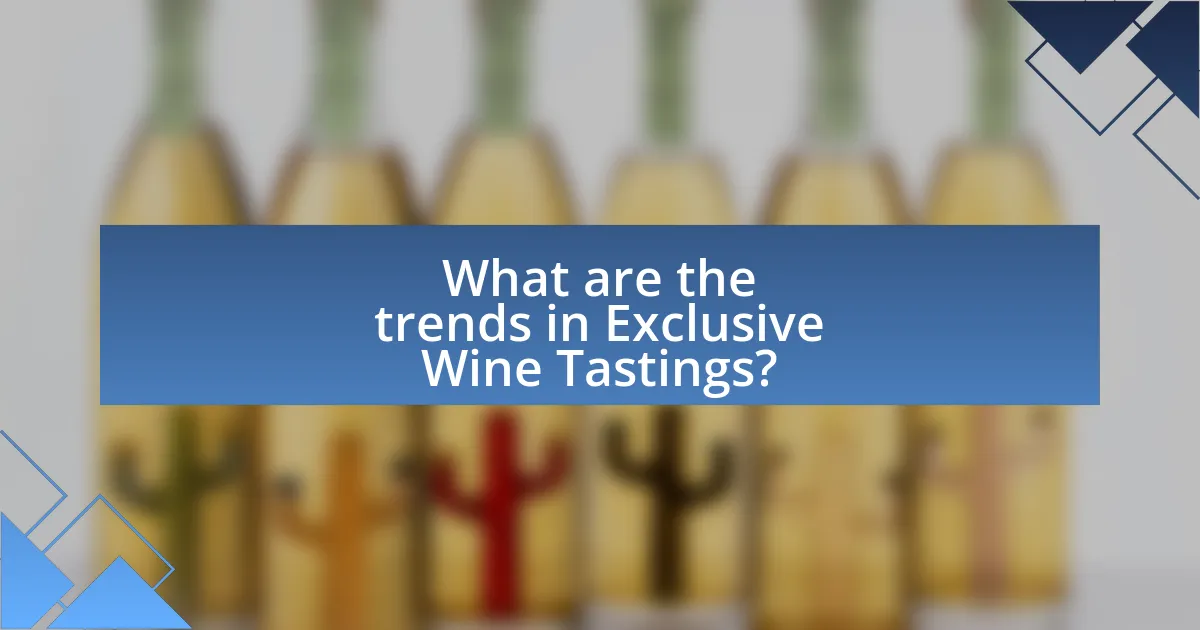
What are the trends in Exclusive Wine Tastings?
Trends in exclusive wine tastings include a growing emphasis on experiential events, personalized experiences, and sustainability. Experiential events focus on immersive activities that engage participants beyond traditional tastings, such as vineyard tours and food pairings. Personalized experiences cater to individual preferences, allowing guests to select wines based on their tastes, which enhances customer satisfaction. Sustainability trends are evident as wineries adopt eco-friendly practices, including organic and biodynamic farming, which appeal to environmentally conscious consumers. According to a report by Wine Intelligence, 60% of wine consumers are interested in sustainable practices, indicating a significant shift towards eco-friendly wine experiences.
How has the concept of Exclusive Wine Tastings evolved over time?
The concept of Exclusive Wine Tastings has evolved from informal gatherings to highly curated luxury experiences. Initially, wine tastings were simple social events aimed at sharing and enjoying wine among friends and family. Over time, particularly since the late 20th century, the rise of wine tourism and the increasing sophistication of wine consumers led to the development of exclusive tastings that focus on rare vintages, unique terroirs, and expert-led experiences. This evolution is evidenced by the emergence of high-profile wine festivals and private events hosted by renowned wineries, which often feature limited-access wines and personalized service, catering to a clientele seeking both education and exclusivity in their wine experiences.
What innovations are being introduced in these events?
Innovations being introduced in exclusive wine tasting events include the integration of augmented reality (AR) technology, which enhances the sensory experience by providing interactive information about the wines. Additionally, sustainable practices are being adopted, such as using eco-friendly packaging and sourcing organic wines, which align with consumer preferences for environmentally responsible choices. These innovations are supported by industry trends indicating a growing demand for immersive experiences and sustainability in luxury events.
How do cultural shifts influence wine tasting trends?
Cultural shifts significantly influence wine tasting trends by altering consumer preferences and perceptions of wine. For instance, the rise of health consciousness has led to increased interest in organic and low-alcohol wines, reflecting a broader societal focus on wellness. Additionally, the growing appreciation for sustainability has prompted wineries to adopt eco-friendly practices, which in turn shapes consumer choices towards wines that align with these values. According to a 2021 survey by the Wine Market Council, 60% of millennials prefer wines that are sustainably produced, illustrating how cultural values directly impact purchasing behavior in the wine industry.
What are the emerging themes in Exclusive Wine Tastings?
Emerging themes in exclusive wine tastings include sustainability, experiential engagement, and personalization. Sustainability is increasingly prioritized, with wineries adopting eco-friendly practices and showcasing organic or biodynamic wines. Experiential engagement focuses on creating memorable experiences through interactive tastings, food pairings, and educational components that enhance the appreciation of wine. Personalization is evident as events cater to individual preferences, offering tailored selections and unique themes that resonate with attendees. These trends reflect a shift towards more conscious and immersive wine tasting experiences, aligning with broader consumer values and expectations.
How are sustainability and organic wines impacting these events?
Sustainability and organic wines are significantly enhancing luxury events by aligning them with environmentally conscious values. These wines attract a growing demographic of consumers who prioritize eco-friendly practices, thereby increasing attendance and engagement at exclusive tastings. For instance, a 2021 study by the Wine Market Council found that 60% of wine consumers are more likely to purchase organic wines, indicating a strong market trend towards sustainability. This shift not only elevates the brand image of the events but also fosters a sense of community among attendees who share similar values regarding environmental responsibility.
What role does technology play in modern wine tastings?
Technology enhances modern wine tastings by providing tools for better sensory analysis, data collection, and consumer engagement. For instance, apps and software allow participants to track their tasting notes, compare wines, and access detailed information about each wine’s origin and characteristics. Additionally, virtual reality experiences can simulate vineyard tours, enriching the tasting experience. According to a study by the Wine Market Council, 60% of wine consumers use technology to enhance their wine knowledge, indicating its significant role in shaping modern wine tasting experiences.
What tips can enhance the experience of attending an Exclusive Wine Tasting?
To enhance the experience of attending an exclusive wine tasting, participants should engage in thorough preparation, including researching the wines and wineries involved. This knowledge allows attendees to ask informed questions and appreciate the nuances of each wine. Additionally, arriving with an open mind and a willingness to explore different varietals can lead to discovering new favorites. It is also beneficial to take notes during the tasting, as this helps in recalling specific flavors and preferences later. Finally, savoring the wines slowly, rather than rushing through them, allows for a deeper appreciation of their complexities. These practices are supported by the fact that informed participants tend to have more enriching experiences, as they can connect more meaningfully with the wines and the stories behind them.
How should attendees prepare for an Exclusive Wine Tasting?
Attendees should prepare for an Exclusive Wine Tasting by researching the wines being featured and familiarizing themselves with wine tasting etiquette. Understanding the specific varietals and regions of the wines enhances appreciation and allows for informed discussions. Additionally, attendees should arrive with an empty stomach to fully enjoy the flavors and aromas without interference from food. Dressing appropriately for the event’s setting is also crucial, as it reflects respect for the occasion. These preparations ensure a more enriching and enjoyable experience during the tasting.
What etiquette should be followed during these luxury events?
During luxury events such as exclusive wine tastings, attendees should adhere to several key etiquette guidelines. First, guests must arrive on time, as punctuality demonstrates respect for the hosts and other attendees. Additionally, it is essential to dress appropriately, often in formal or semi-formal attire, reflecting the event’s upscale nature.
Furthermore, guests should engage in polite conversation, avoiding controversial topics, and should express gratitude to the hosts, either verbally or through a follow-up thank-you note. When tasting wines, it is important to savor the experience without rushing, and to refrain from excessive consumption, as moderation is a sign of sophistication.
Lastly, guests should be mindful of their surroundings, respecting the venue and other attendees by maintaining a courteous demeanor. These practices are rooted in the tradition of luxury events, where decorum enhances the overall experience for everyone involved.
